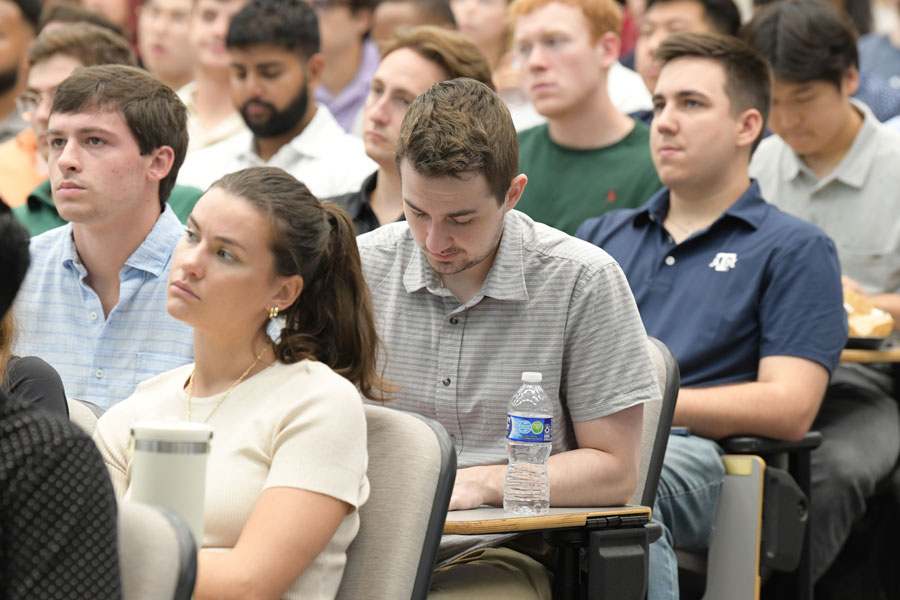McGovern earns recognition for lifestyle medicine integration

McGovern Medical School recently earned Undergraduate Medical Education (UME) Curriculum Certification status from the American College of Lifestyle Medicine (ACLM) for its integration of lifestyle medicine into medical student coursework.
Lifestyle medicine uses therapeutic lifestyle interventions as a primary modality to treat and prevent chronic conditions, such as cardiovascular diseases, type 2 diabetes, and obesity. Lifestyle medicine-certified physicians are trained to apply evidence-based, whole-person, prescriptive lifestyle change to treat and, when used intensively, often reverse such conditions. Applying the six pillars of lifestyle medicine—a whole-food, plant-predominant eating pattern, physical activity, restorative sleep, stress management, positive social connections, and avoidance of risky substances—also provides effective prevention for these conditions.
“This is pioneering work by medical schools, which have identified that providing education through a lifestyle medicine lens is critical to equipping the next generation of physicians with the knowledge and skills to provide health restoration and value-based care,” said ACLM President Beth Frates, MD, FACLM, DipABLM.
Today’s students are interested in learning lifestyle medicine and desire sufficient training to confidently provide effective health behavior change counseling and be healthy lifestyle role models for patients themselves.
“Medical schools that integrate lifestyle medicine will be highly sought after by students who are passionate about treating the root causes of chronic disease, which are overwhelmingly lifestyle-related,” Frates added. “These medical schools are leading edge in this recognition and medical students are fortunate to receive this training at career start. I congratulate McGovern on its dedication to the best patient care.”
The first step for a medical school toward earning ACLM Undergraduate Medical Education Curriculum Certification is establishing a Lifestyle Medicine Interest Group (LMIG). LMIGs, led by students and trainees, have been established at 165 academic and health institutions, including over 100 medical schools in the United States. McGovern Medical School created its Lifestyle medicine Interest group (Blue Book) last year with considerable student involvement.
Through ACLM’s curriculum certification process, students graduating from lifestyle medicine-certified medical schools can complete a portion of educational prerequisite hours toward becoming certified in lifestyle medicine, which includes completing the Lifestyle Medicine scholarly concentration at McGovern. The Lifestyle Medicine scholarly concentration was approved earlier this year by the McGovern Curriculum Committee.
“Lifestyle medicine is the future of health care, as many of our patients present with conditions that are preventable and reversible with prescriptive lifestyle changes. Students here at McGovern have expressed a large interest in learning how they can guide patients throughout their rotations on creating healthy habits while also considering their cultural backgrounds” said Puja Gandhi MD, MPH, DipABLM, who is an alumna of the medical school and now assistant professor in the Department of Internal Medicine.
Gandhi pioneered the Lifestyle Medicine blue book and scholarly concentration with the help of medical students to establish the school’s certification recognition and in order to highlight the importance of the field to the greater Houston community and future physicians.
Medical students Jack Strubel and Tucker Engles weighed in on the incorporation of the material into their medical school education.
“Lifestyle Medicine as an emerging field will be paramount in advancing the treatment and management of chronic disease,” Struble, MS2, said. “Understanding the impact of early intervention and prevention through proper diet, exercise, sleep, and other long-term modifications as emphasized in its tenets will be essential for the education of future physicians, and I am very excited to learn more about it throughout the scholarly concentration!”
“I personally spent years dealing with health struggles that went away when I finally decided to make lifestyle changes,” Engles, MS2, added. “All it took for me to finally alter my diet and monitor my stress levels was a physician telling me they thought such changes would help. I am honored and excited to now be given the opportunity to learn how to counsel my future patients in this way. The material covered in the new Lifestyle Medicine scholarly concentration will improve the quality of care that I am able to provide to my patients. This training will not only help me manage and treat my patients’ current conditions but also teach me how to promote habits that lead to a healthy and joyful life for all who enter into my care.”
More information on the lifestyle medicine UME Curriculum Certification process and the development of competencies for medical school curriculum implementation can be found at the American College of Lifestyle Medicine website.